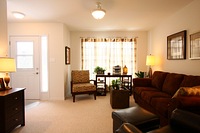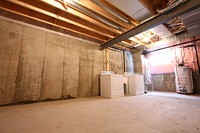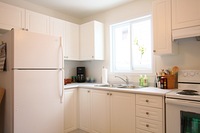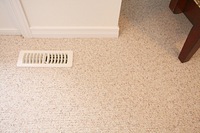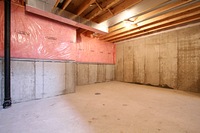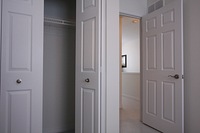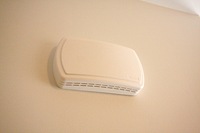Sitemap
- Huron Pines Housing Co-op
- What's Nearby
- Co-op Unit Features
- Sample Unit Photos
- Accessible Units
- Frequently Asked Questions
- What's a Co-operative?
- Becoming a Member
- Housing Charges
- About The Founder
- Note of Appreciation
- Board of Directors
- Contact Information
- Map
External Links
Frequently Asked Questions
- What is a Housing Co-operative?
- Who owns the Co-operative?
- How does Co-operative differ from other rental housing?
- What kind of lease or agreement do we sign?
- What do we pay besides the housing charges?
- What insurance coverage is needed?
- How much time will I have to spend to fulfill my responsibilities to the Co-op?
- How can I become a member?
- How much is the housing charge?
What is a Housing Co-operative?
A Co-operative is a group of people who form a Corporation to provide a service for themselves. In a Housing Co-op, the service provided is housing, and the people who live in the housing are the voting members of the Co-operative Corporation, which owns and operates the housing. The members elect a Board of Directors from among themselves. The members authorize this Board to conduct the day-to-day business of the Co-operative in a manner that satisfies all of the requirements of its Charter, Bylaws, Agreements and Policies.
Who Owns the Co-operative? Who is the Landlord?
The Co-op is the owner, and the only landlord. This means that each member, by virtue of membership and voting rights in the business of the Corporation, is a part owner of the housing project. The members, however, do not own their individual units. They can not buy, sell or sublet their units. They are guaranteed the exclusive right to occupy the unit, as long as they continue to respect the Charter, Bylaws, Occupancy Agreement, and Policies of the Co-operative.
How Does a Co-operative Differ from Other Rental Housing?
There are important differences. Some of them have to do with the way the housing is financed, and some of them have to do with the way it operates.
This Co-op was developed with some financial assistance from the three levels of Government: Federal, Provincial, and The City of London. The Co-op operates on a break-even basis. There is no provision for an outside owner-landlord, so the income received from the "members' loan" and "housing charges" is adequate to cover the Co-op's real expenses.
The care that members take of their units and the careful planning that they do for the long term maintenance can affect the costs. The members then benefit directly through a housing charge payment that is reasonable. The Co-op's housing charges will gradually become more favourable through the long term, when compared to the charges for private rental housing, where a profit is made, and where there is little or no resident influence in the management of the complex.
In social terms, the Co-op's goal is to become a community where the members are "at home," and where living is more than existing within four walls. The methods used to foster this special feeling of community may vary from Co-op to Co-op, depending on the personalities and interests of the members. They do it by organizing social gatherings, special interest groups, and liaisons with other Co-operatives. They can do it by paying special attention to each other's human and civil rights, by identifying and accommodating people's special needs, and by being good citizens of the community outside the Co-op.
What Kind of Lease or Agreement Do We Sign?
In a Co-op there is no "lease" in the ordinary understanding of the word. Instead, there is an occupancy agreement that sets out the obligations of the Co-op to the members, and the responsibilities of the members to the Co-op. This agreement is not tied to "period of time" like a lease; however, members are required to give a specified notice before moving out, usually 65 days.
What Do We Pay Besides the Housing Charges?
You will pay a "member loan", $700 for a Two Bedroom, $540 for a One Bedroom, before you move in. (This could be compared to a last month's rent if you were renting). This member loan will be held by the Co-op until you leave. No interest is paid on this loan. This guarantees your voting rights for as long as you reside in the Co-op. If you leave the unit with no more than normal wear and tear, and your housing charges are not in arrears, your member loan is returned to you within 30 days when you vacate the unit honourably. If not, it may be used to compensate for damage or arrears.
The first month's housing charge is due by the first day of the month, or the day before you take possession of the unit. Included in the amount is your unit's share of the Co-op's expenses: mortgage principal & interest, taxes, insurance on the buildings, general maintenance, cost of utilities in common areas, reserves for future replacement of capital items, and administration.
What Insurance Coverage is Needed?
The Co-op will carry insurance on Co-operative property (the structures), and personal liability on each unit. It will not carry insurance on your individual property (furnishings, clothes, automobile etc.). You are advised to purchase a householder's policy for your possessions. The Co-operators Insurance Company has a very favourable rate for Co-op members.
How Much Time Will I Have to Spend to Fulfill My Responsibilities to the Co-op?
Some of the work of the Co-op will be done by volunteers, working individually and in groups. You may want to get involved with landscaping, socials, newsletters, finances, interviewing, Board of Directors, etc.
The minimum expected of the Co-op members is:
- to pay the housing charges in full and on time
- to attend enough general members meetings, and to get enough information to be able to make intelligent decisions
- to care for their own unit and associated space
- to treat the rest of the community with respect
- to contribute a minimum of 2 hours per month, per unit, of volunteer participation.
Each Co-op needs somewhat more than the minimum participation from each of its members in order to meet its goals. Each Co-op will set its own expectations through discussion and debate.
How Can I Become a Member?
The first step is filling out the application – see links below. It will provide the Co-op with information about your housing needs, your credit rating, and your potential as a member. If the member selection criteria are met, you will be notified that you have been accepted as a prospective member. You will also receive notification when an appropriate unit is available.
Please use the following links to download the application in Word .doc format or in Acrobat .pdf format for easy printing. Download whichever format works best for you. When in doubt, see which one opens and looks best printed. Completed applications should mailed to Huron Pines Office.
Housing Co-Op Member Application Download Links
Email huronpines.office@gmail.com with questions about the application process, vacancies or getting on a waiting list. See our contact information page for map and address.
How Much is the Housing Charge?
The Co-op is designed with twenty-six townhouse units, four one-bedroom units, eighteen two-bedroom units and four fully-accessible units. There is a maximum income restriction of five times the monthly housing charges, which are as follows:
- One-bedroom units are $570 per month plus $10 membership fee plus electricity and water. Heating and hot water included.
- Two-bedroom units are $739 per month plus $10 membership fee plus all utilities.
- Charges for the accessible units are set by the LAHF.
The Co-op has a partnership with London Affordable Housing Foundation to provide four fully accessible units for persons with physical challenges. These one storey, ground floor units are incorporated into Huron Pines and have all rights and responsibilities of membership.
Huron Pines
Huron Pines, the New Housing Co-op in London-Ontario's North East is a community project providing twenty-six comfortable, energy-efficient townhomes to qualifying members.

